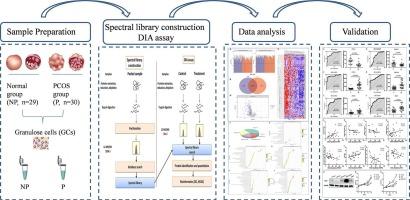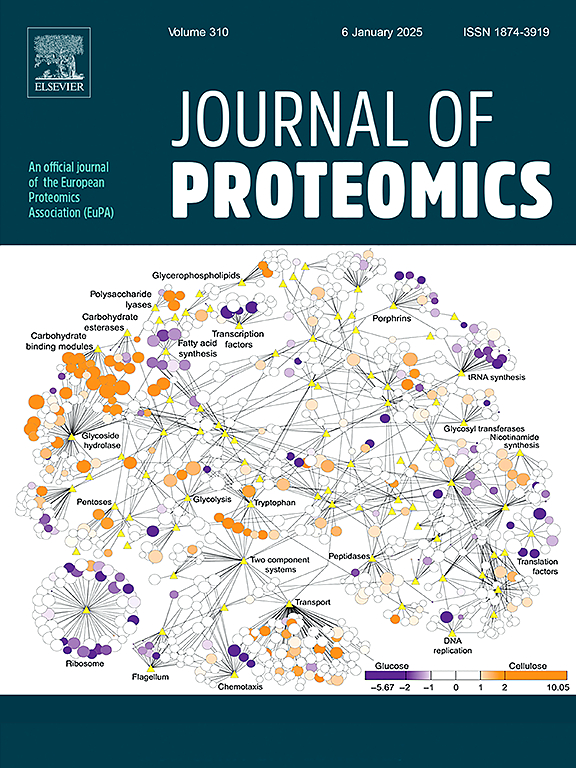DIA proteomic and PRM validation through human granulose cells profiles screen suitable biomarkers for polycystic ovary syndrome patients
IF 2.8
2区 生物学
Q2 BIOCHEMICAL RESEARCH METHODS
引用次数: 0
Abstract
The aim of this study is to identify differentially expressed proteins (DEPs) in granulose cells (GCs) from women with or withoutpolycystic ovary syndrome (PCOS) via data independent acquisition (DIA) proteomic analysis.A total of 63 women were recruited for this study, 34 PCOS patients as experimental group (P), and 29 women without PCOS as Normal group (NP). DIA-based proteomic analysis was performed to identify DEPs in GCs between the P and NP samples. Certain typical DEPs were further validated by Parallel reaction monitoring (PRM), and correlation analysis was performed between these DEPs and the clinical characteristics.Cell vitality was measured by CCK-8 assay. DIA analysis revealed 174 significantly DEPs, of which 7 were upregulated and 167 downregulated. Bioinformatics analysis was performed to analysis the significantly DEPs. The PRM experiment confirmed TOP2A and SPHKAP were upregulated significantly in P by comparing to NP, while GM2A, MRPS16, APOA2 and FGF2 were downregulated significantly. Most notably, Correlation analysis revealed that TOP2A, SPHKAP, MRPS16 and FGF2were positively correlated with TG, AMH and Age, but negatively correlated with Menarche age, DBIL, FT3, Basal serum FSH and LH.Meanwhile, CCK-8 assay has shown that downregulation of FGF2 could weaken cell viability. Finally, a panel of DEPs were identified in the GCs of patients with PCOS, of which certain significant DEPs might play essential roles in the pathogenesis of PCOS, could be regarded as candidate biomarkers for PCOS.

通过人类粒细胞图谱进行 DIA 蛋白质组学和 PRM 验证,筛选出适合多囊卵巢综合征患者的生物标记物。
本研究旨在通过数据独立采集(DIA)蛋白质组学分析,鉴定患有或未患有多囊卵巢综合征(PCOS)的女性颗粒细胞(GCs)中的差异表达蛋白质(DEPs)。本研究共招募了 63 名女性,其中 34 名 PCOS 患者为实验组(P),29 名未患有 PCOS 的女性为正常组(NP)。通过基于 DIA 的蛋白质组学分析,确定了 P 组和 NP 组样本 GC 中的 DEPs。平行反应监测(PRM)进一步验证了某些典型的DEPs,并对这些DEPs与临床特征进行了相关性分析。DIA 分析发现了 174 个明显的 DEPs,其中 7 个上调,167 个下调。生物信息学分析对明显的 DEPs 进行了分析。PRM实验证实,与NP相比,TOP2A和SPHKAP在P中明显上调,而GM2A、MRPS16、APOA2和FGF2则明显下调。最值得注意的是,相关性分析表明,TOP2A、SPHKAP、MRPS16 和 FGF2 与 TG、AMH 和年龄呈正相关,但与初潮年龄、DBIL、FT3、基础血清 FSH 和 LH 呈负相关。最后,研究人员在多囊卵巢综合征患者的GC中鉴定出了一组DEPs,其中某些重要的DEPs可能在多囊卵巢综合征的发病机制中起着至关重要的作用,可被视为多囊卵巢综合征的候选生物标志物。
本文章由计算机程序翻译,如有差异,请以英文原文为准。
求助全文
约1分钟内获得全文
求助全文
来源期刊

Journal of proteomics
生物-生化研究方法
CiteScore
7.10
自引率
3.00%
发文量
227
审稿时长
73 days
期刊介绍:
Journal of Proteomics is aimed at protein scientists and analytical chemists in the field of proteomics, biomarker discovery, protein analytics, plant proteomics, microbial and animal proteomics, human studies, tissue imaging by mass spectrometry, non-conventional and non-model organism proteomics, and protein bioinformatics. The journal welcomes papers in new and upcoming areas such as metabolomics, genomics, systems biology, toxicogenomics, pharmacoproteomics.
Journal of Proteomics unifies both fundamental scientists and clinicians, and includes translational research. Suggestions for reviews, webinars and thematic issues are welcome.
 求助内容:
求助内容: 应助结果提醒方式:
应助结果提醒方式:


